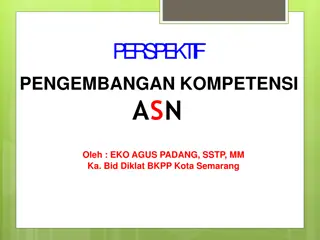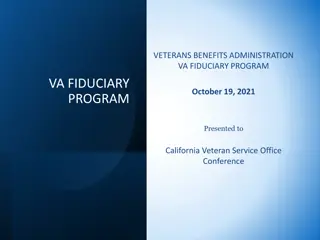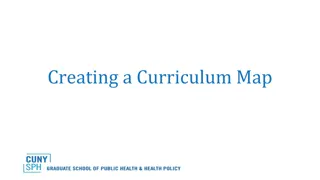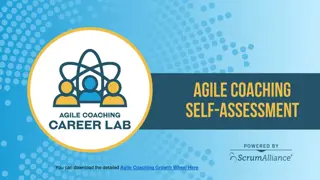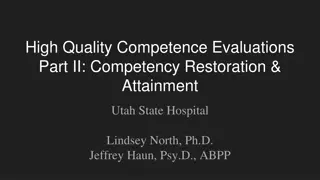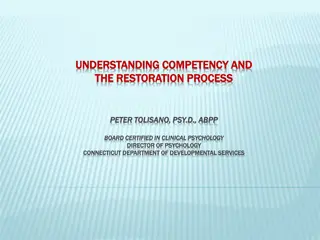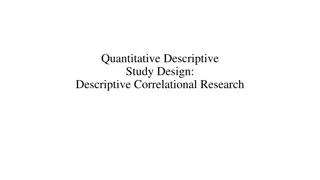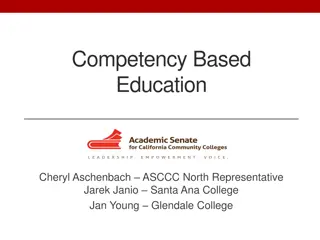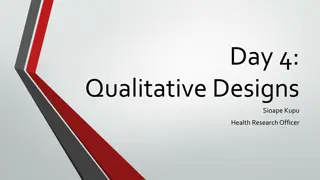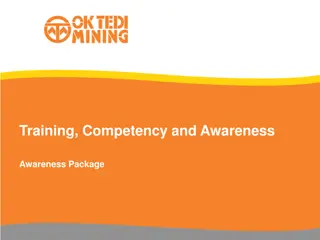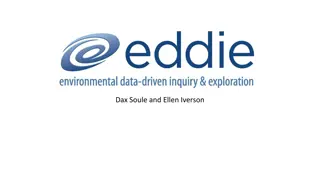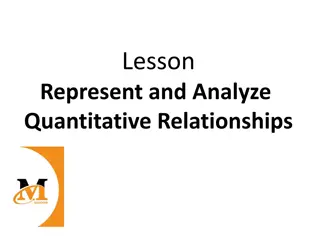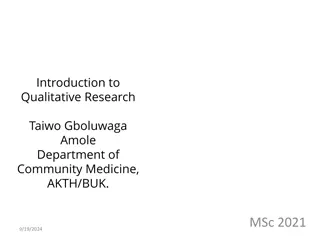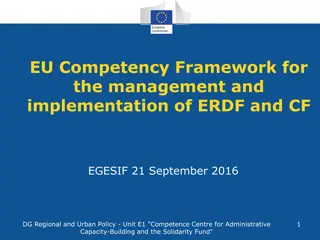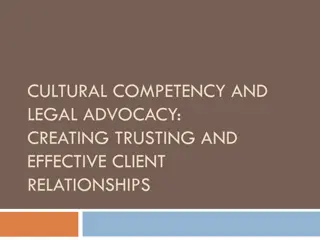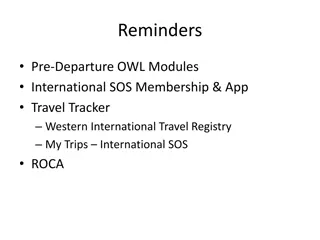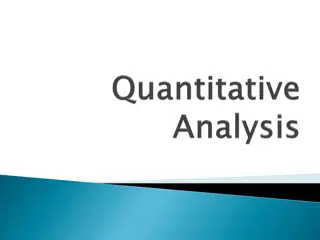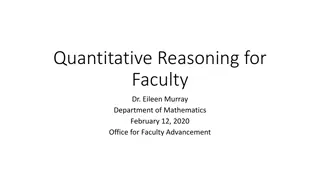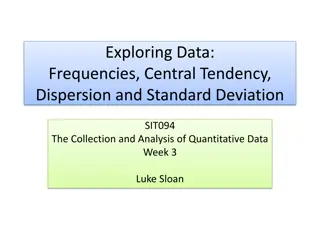Empowering Competency Development for Civil Servants: a Comprehensive Overview
In today's dynamic governance environment, the development of competencies for civil servants is crucial for efficient public service delivery. The journey involves continuous learning, training, and evaluation to enhance skills and career paths. This article explores the legal framework, rights, an
4 views • 49 slides
Digital Competency Maturity Model 2.0 for Accounting Firms - Overview and Implementation
The Digital Competency Maturity Model 2.0 (DCMM 2.0) is a framework designed to help professional accounting firms evaluate and enhance their digital competencies. Released as an upgrade to the previous version in 2017, DCMM 2.0 offers a structured approach for firms to assess their current level of
4 views • 19 slides
Comprehensive Online Competency Module Platform for Healthcare Professionals
A detailed overview of a comprehensive online competency module platform catering to healthcare professionals, offering specialized modules on neonatal sedation, pediatric sedation, moderate sedation, deep sedation, bloodborne pathogens, fire safety, fluoroscopy, life support, and more. Features inc
4 views • 9 slides
Approaches to Competency-Based Approaches: Support Devices at the UHA Scale
Deployment of Competency-Based Approaches at UHA entails personalized support mechanisms for undergraduate, professional, and master's students. The process involves multiple levels of actors, structured timelines, and a framework for initiating and implementing the approach. Various strategies are
1 views • 28 slides
Overview of Research Process and Quantitative Research Phases
The research process involves steps like identifying, locating, assessing, and analyzing the research question to find answers. It includes quantitative and qualitative approaches, with specific phases like conceptual, design, empirical, analytic, and disseminating phases in quantitative research. E
9 views • 27 slides
Understanding Competency-Based Education in Modern Curricula
Explore the differences between new and old curricula, grasp the concept of theoretical versus competency-based education, and delve into the benefits of competency-based learning. Discover how competency-based education shifts the focus from grades to students' competence in subjects.
4 views • 10 slides
Changes in ITC for 2025: Exam Structure, Competency Framework, and More
Exciting changes are coming to the Initial Test of Competence (ITC) in 2025, including adjustments to the exam structure, mark allocation, number of papers, competency framework, and more. The new competency framework emphasizes six competency areas, with a focus on an even spread over three papers.
18 views • 4 slides
Understanding Quantitative and Qualitative Research Methods
Exploring the differences between quantitative and qualitative research methods, this content delves into the importance of qualitative research, various methodologies such as focus groups and interviews, data collection, research ethics, and analysis techniques. It also covers the elements of the r
4 views • 43 slides
VA Fiduciary Program Overview
The Veterans Benefits Administration's Fiduciary Program aims to provide oversight for vulnerable beneficiaries who are unable to manage their VA benefits. The program involves a competency determination process, including medical opinions and court determinations, to ensure the proper appointment o
0 views • 25 slides
Creating a Curriculum Map for Competency-Based Education
This presentation aims to guide faculty and staff in competency-based curriculum mapping at the program level. It covers the definition of curriculum mapping, a recommended framework, steps for identifying program competencies, developing a matrix, and mapping courses to competencies. Utilize this r
0 views • 11 slides
Understanding Agile Coaching Competencies and Growth Wheel
Explore the detailed Agile Coaching Growth Wheel, assessing competency areas like Self-Mastery, Serving the Business, Team, Org Change, and more. Dive into competencies such as Coaching, Leading, and Facilitating, crucial for guiding sustainable change and developing individuals and teams. Enhance y
0 views • 12 slides
Competency Evaluation Process: A Comprehensive Overview
This document delves into the process of competency evaluations, specifically focusing on competency restoration and attainment at Utah State Hospital. It covers key steps such as petition, order for evaluation, findings of incompetency, competency restoration treatment, and review. It outlines the
0 views • 41 slides
Understanding Criminal Competency in Legal Proceedings
Competency in criminal cases is crucial for ensuring the accuracy and fairness of legal proceedings. Adjudicative competence, based on standards like the Dusky Standard, relates to a defendant's ability to understand and engage in legal processes. Mistaken beliefs, such as equating clinical disorder
2 views • 12 slides
Contrasting Qualitative and Quantitative Traits in Genetics
Genetic traits in organisms can be qualitative or quantitative, with qualitative traits controlled by single genes and showing distinct variations, while quantitative traits are influenced by multiple genes and environmental factors, resulting in continuous variations. Qualitative genetics focuses o
0 views • 13 slides
Understanding Quantitative Research Design in Social Science
This content covers various aspects of quantitative research design, including descriptive and correlational studies, research design blueprint, robust research design considerations, and different types of research approaches. It emphasizes the characteristics, techniques, and terminologies associa
0 views • 24 slides
Understanding Competency-Based Education in Practice
Competency-Based Education (CBE) allows students to progress based on mastery of skills rather than seat time. It offers personalized learning, efficient outcomes, and focuses on employer needs. Examples include CTE courses, noncredit pathways, and open entry/exit programs. The approach emphasizes c
1 views • 12 slides
Understanding Quantitative Analysis for Decision Making in Management
Quantitative analysis is a crucial scientific approach for managerial decision-making, involving data manipulation to derive valuable information. This method encompasses problem definition, model development, and acquiring input data. Mathematical models, variables, and parameters play key roles in
0 views • 11 slides
Qualitative vs. Quantitative Approaches in Health Research
Exploring the different methodologies, paradigms, and methods used in health research, this content highlights the distinction between qualitative and quantitative designs. It covers research questions, aims, objectives, hypotheses, and various quantitative approaches such as experimental and observ
1 views • 28 slides
Understanding Quantitative Genetics Principles in Animal Breeding
Quantitative genetics focuses on the inheritance of characteristics based on degree rather than kind, compared to qualitative genetics. It involves polygenes controlling quantitative traits, which exhibit continuous variation and can be measured using metric units. Qualitative traits, on the other h
0 views • 22 slides
Understanding Quantitative Research in Social Studies: A Comprehensive Overview
An in-depth exploration of quantitative research methods in social studies, covering concepts, data analysis, survey techniques, causality identification, and setting up research projects. Emphasizes the importance of grasping strengths, pitfalls, and key points in quantitative research and understa
0 views • 51 slides
Comprehensive Training and Competency Program for Mobile Plant and Equipment
This comprehensive program focuses on training, competency, and awareness for mobile plant and equipment within OTML. It emphasizes high standards of safety, health, environment, and competency-based learning to ensure all personnel, including contractors, are appropriately trained. From assessments
0 views • 13 slides
Project EDDIE: Enhancing Student Quantitative Reasoning with Large Datasets
Project EDDIE focuses on improving student quantitative reasoning through inquiry-driven exploration of complex datasets. The project aims to support instructors in guiding students to enhance their understanding of scientific concepts and quantitative skills. With a commitment to community and lear
0 views • 6 slides
Enhancing Religious and Cultural Literacy for Effective Engagement
Explore the importance of religious literacy and competency in engaging diverse communities during disasters. Learn how to differentiate between literacy and competency, understand the needs of partners, provide culturally appropriate services, and build sustainable relationships. Continuous learnin
0 views • 20 slides
Understanding and Representing Quantitative Relationships
Explore how to represent and analyze quantitative relationships using graphs, tables, and equations. Practice with unit rates, plotting points in a coordinate plane, and understanding independent and dependent variables. Develop skills in creating equations, tables, and graphs to model relationships
0 views • 120 slides
Developing Communicative Competence in English Language Teaching
In English language teaching, the main goal of a communicative classroom is to foster students' communicative competence. This includes grammatical competency, sociocultural competency, discourse competency, and strategic competency. By focusing on these aspects, educators aim to enhance students' a
0 views • 7 slides
Witness Competency Guidelines and Rules in Legal Proceedings
Witness competency in court proceedings is crucial for the administration of justice. Modern views and historical practices shape the rules governing witness competency, covering aspects such as firsthand knowledge, oath requirements, refusal to be cross-examined, and handling of hypnotized witnesse
0 views • 31 slides
Administrative Hearing Professionals: Competency and Evidence Considerations
Explore the key aspects of competency objections and evidence considerations in administrative hearings based on a fact scenario involving an employer, a trucking company, and a terminated driver. Learn about witness competency rules, burden of proof, and evaluation of evidence to make informed ruli
0 views • 19 slides
Understanding Research Methods in Public Health
Exploring the nuances of qualitative and quantitative research methods in the context of public health, this content delves into how each approach offers unique insights and perspectives. It discusses the importance of qualitative research in uncovering underlying factors influencing health, interpr
0 views • 77 slides
EU Competency Framework for ERDF/CF Management & Implementation
This EU Competency Framework, developed by DG Regional and Urban Policy, provides a comprehensive approach to assessing competencies for managing and implementing ERDF and CF. It includes self-assessment tools, identifies competency gaps, offers blueprints for training programs, and covers all key i
0 views • 9 slides
Cultural Competency and Legal Advocacy: Building Trusting Client Relationships
Understanding cultural competency is essential in legal advocacy to provide effective and trusting client relationships. Cultural competence involves equal access and non-discriminatory practices, enabling communication and intervention for clients from diverse backgrounds. The importance of cultura
0 views • 18 slides
Building Change Competency: Keys to Successful Change Management
Discover the importance of building change competency and the keys to successful change management. Explore why change competency is crucial for organizational success, along with strategies for managing change effectively. Learn about different change management approaches and the benefits of a pro
0 views • 25 slides
Quantitative Research Framework for Historical Disciplines
Scholarly communities in historical disciplines are combining quantitative and qualitative methods to study phenomena that change over time. The proposed general methodological reflection aims to enhance research in historical linguistics through quantitatively driven models and claims. Quantitative
0 views • 18 slides
Understanding Intercultural Competency and Cultural Identity
Explore the concept of culture, intercultural competency, and cultural identity through reflections on one's heritage, experiences, values, and beliefs. Learn the importance of developing intercultural competency to communicate effectively across diverse cultures.
0 views • 12 slides
Mastering Competency-Based Interview Questions
Enhance your interview skills by learning how to craft strong responses to competency-based questions using a structured format. Explore tips, strategies, and examples to excel in your next job interview. Utilize tools like Unifrog to prepare and practice for common competency questions effectively.
0 views • 9 slides
Understanding UV-Visible Spectrophotometry for Quantitative Analysis
Spectrometry in quantitative analysis involves determining substance concentration through spectrophotometry. UV-Visible Spectrophotometry measures light absorption in the UV or visible region using the Beer-Lambert Law, relating absorbance to substance concentration. The electromagnetic spectrum en
0 views • 15 slides
Empowering Through Quantitative Literacy: A Roadmap to Mathematical Empowerment
In a modern society filled with data and statistics, quantitative literacy is essential for individuals to think critically, question authority, and make informed decisions. The ability to understand and engage with mathematical concepts is crucial for addressing complex issues and thriving in today
0 views • 15 slides
Understanding Quantitative Data Analysis in Research
Dive into the world of quantitative data analysis with a focus on frequencies, central tendency, dispersion, and standard deviation. Explore the collection and analysis of numerical data, levels of measurement, and methods for quantifying social concepts. Learn about the importance of capturing data
0 views • 25 slides
Essential Forklift Safety and Competency Guidelines
Comprehensive workplace assessment and competency guidelines for forklift operators, covering essential topics such as forklift safety, driver competency, spotters' roles, barriers and cordons, fitting for purpose considerations, and peer review elements including relevant questions. The guidelines
0 views • 13 slides
Child Witnesses in Criminal Courts: Legislation & Judicial Perceptions
Prof. Nicholas Bala discussed legislation and judicial perceptions regarding child witnesses in the criminal courts, focusing on Bill C-2 amendments, competency inquiries, the Canada Evidence Act, and survey findings on child competency. The presentation highlighted changes in the legal framework to
0 views • 38 slides
Evolving Regulations in Health Professions: A Focus on Competency in Belgium
Belgium has navigated a shift from omnipotency to transparent competency in the regulation of health professions. The laws on health professions and scope of practice have evolved to distinguish between autonomous and non-autonomous professions, emphasizing the importance of competency over traditio
0 views • 20 slides
